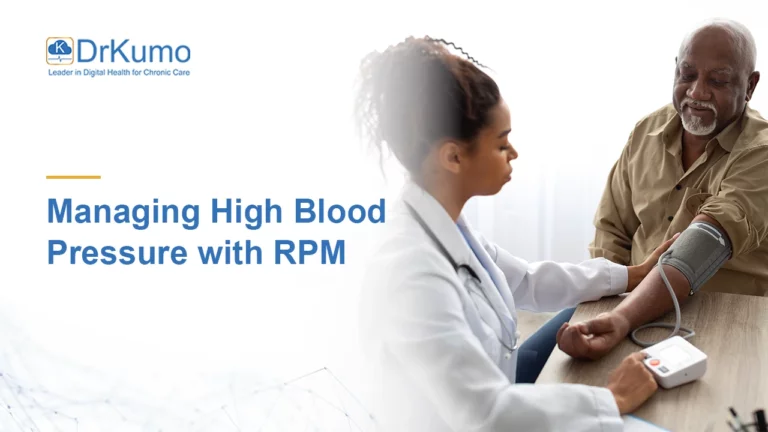Chronic kidney disease (CKD) is a debilitating condition affecting millions of people, particularly patients with type 2 diabetes and pre-existing kidney problems. The damage to the kidneys can be caused by a variety of factors, including uncontrolled blood sugar levels in people with type 2 diabetes and hypertension. Left untreated, CKD can lead to end-stage kidney failure and other serious health complications. Early detection and treatment is essential to slowing the progression of the disease and preventing complications. For healthcare providers (HCPs), it is crucial to stay informed on the latest treatment alternatives and how remote patient monitoring (RPM) can aid in the treatment of CKD.
Potential Treatment Options
Potential treatment options for this chronic disease include:
- Medications to control high blood pressure and diabetes.
- Lifestyle changes such as maintaining a healthy diet, regular exercise, and avoiding smoking and excessive alcohol consumption.
- Kidney-specific medications to slow the progression of the disease, such as angiotensin-converting enzyme (ACE) inhibitors and angiotensin receptor blockers (ARBs).
- Dialysis or kidney transplant in advanced stages of the disease.
- Monitoring of kidney function and blood pressure through regular check-ups and lab tests.
- RPM, which uses technology to track vital signs, medication adherence, and other aspects of the patient’s health and well-being, can be useful to monitor patients with CKD.
- Stem cell therapy is also under research for its potential to regenerate damaged kidney cells.
- Kidney-protective diets, also known as renal diets, that are low in protein, sodium, and phosphorus can be beneficial for CKD patients.
- In some cases, surgery may be recommended to address underlying causes of CKD, such as a blocked kidney artery.
It is important to note that the remedy options will depend on the stage of the disease and other factors specific to the patient. The healthcare provider will work with the patient to determine the best recovery solutions for their individual needs.
The Latest Treatment for Chronic Kidney Disease
A new CKD treatment is now available for patients. Farxiga (dapagliflozin) is an oral tablet that was recently approved by the U.S. Food and Drug Administration (FDA) as a new CKD treatment. As a SGLT2 inhibitor, Farxiga works by blocking the reabsorption of glucose in the kidneys, reducing the risk factors of CKD progression. This helps to lower glucose levels in the blood, decrease the risk of kidney damage, and reduce the risk of cardiovascular death and hospitalization for heart failure in adults with CKD.
While Farxiga has been shown to be effective in slowing the progression of CKD in adults who are at risk of disease progression, it is important to note that it is not a cure for CKD and should be used in conjunction with other remedies such as blood pressure and cholesterol-lowering medications. It is also important to note that Farxiga is not recommended for patients with type 1 diabetes or for patients with a history of diabetic ketoacidosis. This new treatment for CKD offers new hope for the management of this debilitating disease.
Integration of DrKumo Remote Patient Monitoring with CKD
DrKumo is a leader in providing scalable and real-time remote patient monitoring solutions to address the most pressing issues in healthcare. DrKumo’s easy-to-use solution is powered by advanced technology, is compliant with HIPAA regulations, and is accessible through mobile devices. It also includes continuous real-time monitoring and AI/ML capabilities.
One of the best ways healthcare professionals can manage patients remotely is through RPM solutions. DrKumo offers RPM technology solutions that can help healthcare professionals take care of their patients remotely. These solutions allow them to keep track of patients’ progress and make adjustments to their treatment plans, reducing the need for readmissions. This is particularly useful for patients with CKD who may have difficulty getting to appointments or require frequent monitoring.
With the help of RPM technology, healthcare professionals can monitor patients’ vital signs, track medication compliance, and monitor for symptoms of CKD progression. This allows them to quickly identify any problems and make adjustments to treatments as needed. This can help to reduce the risk of complications and hospitalization for CKD patients.
Conclusion
In summary, CKD is a serious condition that can lead to serious health complications if left untreated. New remedy options, such as Farxiga, have become available and have been shown to be effective in slowing the progression of CKD in adults who are at risk of disease progression. HCPs can use RPM technology solutions like DrKumo to monitor and manage patients remotely, reducing the need for the patient to be readmitted, and helping to reduce the risk of preventable complications.
Do not miss this opportunity to make a real difference in the treatment of CKD, contact DrKumo now to start your journey towards exceptional patient outcomes through their RPM program.








